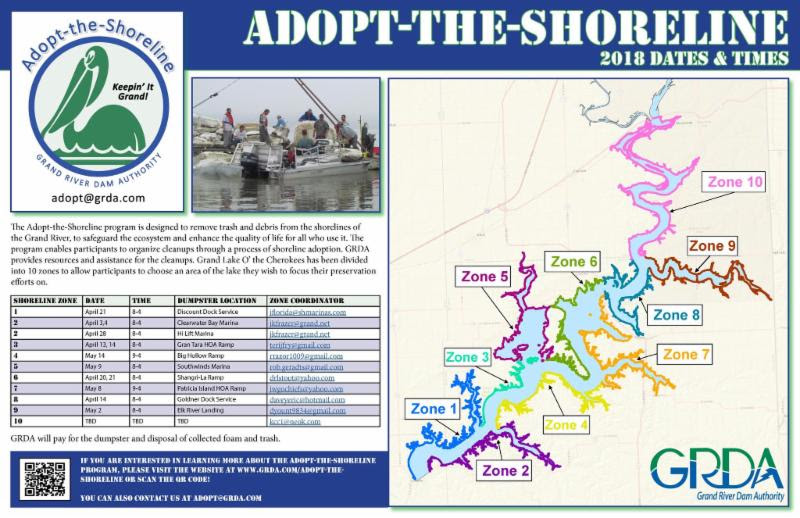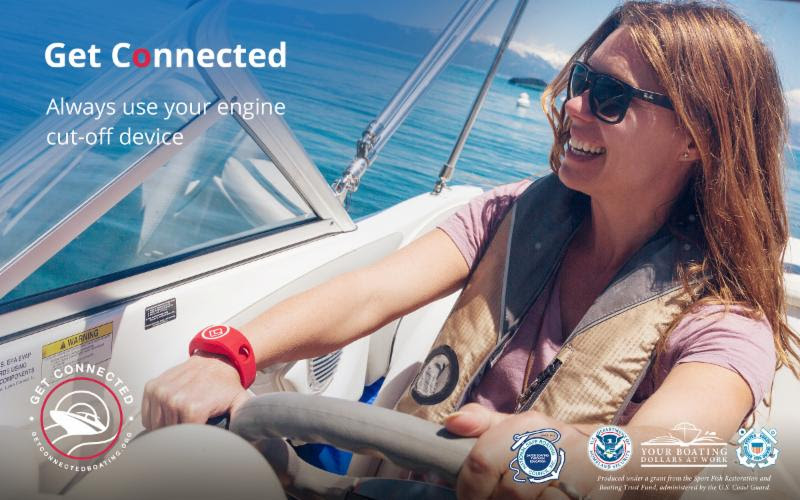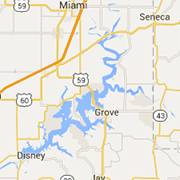May 8 GRDA Weekly Updates

Water Rescues Rising
GRDA Police and emergency personnel from other emergency response agencies have been busy the past weeks answering calls for swift-water rescues at the Low Water Dam on the Grand River below Kerr Dam. On two separate occasions in the last two weeks, people that were standing on the rocks of the low-water dam were overcome by high water created by the release of water from Kerr Dam upstream.
The first incident occurred when a lone adult male was on the rocks of the dam fishing and water levels suddenly came up, surrounding him with the rush of water that was too dangerous to walk across. The subject was swept into the torrential waters below the dam and was rescued from the river by the occupants of a nearby boat before responders arrived. The subject was transported to a local hospital for treatment. He stated that he heard the warning sirens that are sounded to warn people of the increasing water level, but he chose to ignore the warning and the water levels came up much quicker than he anticipated.
The second incident occurred when two adult males were also standing on the rip-rap of the dam fishing just before 10 PM in the evening. They also admitted they heard the audible sirens to indicate a warning of rapidly increasing water releases, and they also made the decision to ignore the warning siren to clear the area. Both individuals narrowly escaped being swept away by the rushing water before releases at Kerr Dam could be stopped and GRDA officers could rescue them from the dam by boat. They were rescued without injury and admitted they were lucky to be alive.
Both of these incidents could have been easily avoided had the individuals involved adhered to the law and left the area of the dam when the warning sirens were activated. The result of their conscious choice to not abide by the law could have easily resulted in serious injury or death, and put the lives of others at risk in the attempt to rescue them. They were each fortunate to walk away from the incidents, but will face heavy fines and possible time in jail for their poor choices.
GRDA Police Recovers Body from Neosho River
The Grand River Dam Authority Police Department continues to investigate after the body of a 34-year male was found in the Neosho River early Saturday afternoon on May 5th. According to GRDA Police, fishermen first spotted the body in the river, about a mile north of the low water dam, in the Miami area. GRDA was notified shortly before 1 PM and responded to the scene to make the recovery. The body, which showed no obvious signs of trauma, was turned over to the Oklahoma State Medical Examiner. No other details are available at this time. The GRDA Police Department is continuing its investigation.
Grand Lake Cleanup Continues with "Lend A Hand"

Great strides have been made in the past year in protecting our environment to provide a better quality of life for all who use the waters of GRDA. The Adopt the Shoreline program has made a significant impact in clearing shoreline debris from Lady Grand in recent months, in addition to the efforts made by our GRDA Shoreline Maintenance Crew. These efforts will continue with the Lend a Hand to Lady Grandprogram, where we encourage all property owners, businesses, civic groups and all lake-goers to join in the annual effort to clean our shoreline to make it cleaner and safer for all users of the lake. This is a joint effort between the Grand River Dam Authority (GRDA) and the America’s Boating Club (ABC) a/k/a Grand Lake Power Squadron.
Regardless of the unsightly look of lakeside debris, we often forget about the impact the rubbish has on our natural resources. The breakdown of dock foam into pellets is hazardous to birds. Many types of birds have been found to feed on these pellets, most likely because they mistake them for fish eggs or other types of food. Ingestion of debris can lead to starvation or malnutrition if the ingested items block the intestinal tract, preventing digestion, or accumulate in the digestive tract, making the animal feel “full” and lessening its desire to feed. Marine mammals, turtles, birds, fish, and crustaceans all have been affected by entanglement in or ingestion of floatable debris.
Entanglement in debris is also a problem. An animal might try to use a piece of floatable debris for shelter, as a plaything, or as a source of food (if other plants and animals are already trapped in the debris or if the debris resembles prey that is part of the animal’s normal diet). It can also cause strangulation or suffocation.
In an effort to make a positive impact on our environment, we encourage everyone to take responsibility for an area of Grand Lake, big or small, pick up the trash and take it to any of the listed sites, where dumpsters will be available for free disposal.
Mark your calendar for the annual shoreline clean-up for June 2 from 9:00 am until 2:00 pm. You do not want to miss an opportunity to dispose of dock Styrofoam or other debris excluding tree limbs, tires, batteries, paint and household garbage at no charge. No commercial dumping of dock foam will be allowed. Dumpsters for lake debris will be available at the following locations:
Grove Springs Park
Bernice State Park
Church on the Lake
449599 E. Highway 85
Ketchum, Ok. 74349
This annual event was started by the ABC in 2005 in partnership with the GRDA. Over the years, large amounts of debris have been removed, especially loose pieces of dock foam. With over 1,300 miles of shoreline, Lady Grand needs all of us to pitch in and help. For more information contact John Walter, Environmental Officer, ABC (918) 314-3773 or Ed Ferguson, Community Relations Officer, GRDA at (918) 256-0890.
Life Jacket Saves Lives

Swift Water Training

GRDA Police hosted a Swift Water Operations rescue course last week to teach emergency responders the techniques used to save lives in water related incidents. A dozen responders from GRDA Police and several area fire departments attended the course held on Grand Lake and the Illinois River.
Lake Rules

Did You Know?

True or False: 25% of all boating accidents involve a personal watercraft that was borrowed.
Answer: False - the number is actually much higher, at over 50%. Before loaning your boat to anyone, make sure they are familiar with the all operational rules for safe handling of your boat in particular. You may even find it helpful to create a safe boating guide full of tips and instructions to keep on board your watercraft.
Adopt The Shoreline

During the month of April the Adopt the Shoreline program has collected nearly 26 tons of foam and trash from the shorelines.
We are scheduled to have two Zone Cleanups this week, Zone 7 on Tuesday and Wednesday in Zone 5, with two next week in Zone 4 on May 14 and Zone 9 is pending. Once these are completed, it will conclude the Spring ATS cleanup programs.
We will resume cleanups for all zones in August for the Fall schedule.
Since the first of the year, the combined efforts of the ATS program and GRDA shoreline crew have resulted in 75 tons of Styrofoam and trash being removed from the Grand Lake shorelines.
We hope to break our goal of 100 tons of trash collected by June 1st.
THANK YOU to all who are helping us in Keepin' It Grand!
Respect the Water

Check the Lighting on Your Vessel Before You Venture Out on the Water.

A reminder to all that Docking Lights ARE NOT headlights and should not be used while your vessel is underway. Dock lights will blind other boaters and restrict their ability to see your navigation lights, putting everyone at risk. Dock Lights should only be used as intended, to help guide you in and out of a dark boat slip at night.
"Updates" on the Web

Did you not receive our latest GRDA Update? Do you have a friend that wants to see our Updates? You can now go to our website at GRDA.com to view the latest edition of GRDA Police Updates. Go to the Lakes/River tab, open the GRDA Police tab and click on the GRDA Police Update for the latest version of our email release.
Boating Tips From the GLSPS

The pivot point of the boat determines how it turns. The point is normally located 25% to 40% aft from the bow. As the boat starts to move forward, the point shifts forward initially, then moves aft as the speed increases. This action is important for the boater to recognize especially when maneuvering in congested areas or leaving a dock at slower speeds. An example is a forward departure from a dock where the stern will swing into the dock because the pivot point moved forward causing the stern to swing wider. A back-away departure may be the easiest maneuver when possible.
Interested in becoming more confident in your boating skills? Boat Smart from the start and take a course from America’s Boating Club, the United States Power Squadrons. For local information visit our website at: usps.org/grandlake or on Face Book at GLSPS.
NAV TIME

A Summary of Boating Laws, Navigation Regulations & Tips
That All Boat Operators Should Know
Fueling Your Vessel
Serious accidents can occur while fueling. Never fuel at night unless it is an emergency. If you must refuel after dark, use only electric lights. To protect the water environment, try to refuel away from the water or at a commercial fueling site.
Before beginning to fuel:
· Tie the boat securely to the fuel dock
· Ask all passengers to leave the boat and go onto the dock.
· Do not allow anyone in your group or others at the fuel dock to smoke or strike a match.
· Check to see that fuel lines, connections and fuel vents are in good condition.
· Turn off anything that might cause a spark – engines, fans, or electrical equipment.
· Shut off all fuel valves and extinguish all open flames, such as galley stoves and pilot lights.
· Close all windows, ports and doors, and other openings to prevent fumes from entering the boat.
· Remove portable fuel tanks from the boat and fill them on the dock.
· Make sure fire extinguishers are within reach.
While filling the tanks:
· Keep the nozzle on the fuel-pump hose in solid contact with the tank opening to prevent a static spark.
· Use caution and fill the tank slowly to avoid spilling fuel into the boat’s bilge or into the water. Use an oil-absorbent pad to catch drips and spills.
· Never fill a tank to the brim – leave room for the fuel to expand.
After fueling:
· Put the cap on tightly to prevent vapors from escaping.
· Wipe up any spilled fuel and properly dispose of the used paper towels or rags on shore.
· Open all windows and ports, and other openings.
· If your boat is equipped with a power ventilation system (exhaust blower), turn it on for at least four minutes before starting your engine. This will help eliminate fuel vapors in the bilge.
· Before starting the engine, sniff the bilge and engine compartment for fuel vapors. Continue ventilating until you cannot smell any fuel vapors. Consider installing a gas vapor detection and alarm device.
· Start the engine and then reload your passengers.
Make sure you have enough fuel before casting off. Operating at two-thirds throttle instead of full-throttle will conserve fuel. The following rule will help prevent running out of fuel:
- One-third to get out.
- One-third to get back.
- One-third in reserve for emergencies.
Evaporating gasoline creates vapors or fumes that are heavier than air. These fumes settle to the bottom of the vessel where they could explode if enclosed areas, such as the bilge, are not ventilating properly to remove fumes.
Get Connected

Upcoming Events


By the Book

The Administrative Regulations of GRDA describe the organizations, operations, and procedures for the Grand River Dam Authority with respect to its administration, rulemaking, and other activities and are intended to supplement and interpret pertinent provisions of state statutes.
The following information are excerpts of the GRDA Administrative Regulations Title 300 Chapter 35 that are provided in an effort to educate the public about what regulations are enforced on GRDA waterways and properties. Many of these regulations have changed effective September 11, 2017. All GRDA regulations are available for review at GRDA.com.
PERMITS FOR WHARVES, LANDINGS, BUOYS, BREAKWATERS AND DOCKING FACILITIES
300:35-11-12. Dock modification prohibited Any person, firm, corporation, business or other entity must obtain permission from GRDA prior to making any modification, change, addition or improvement to an existing private or commercial dock, landing, anchorage, boat house, breakwater, buoy, rail-system or tram system. If any such structure will be reconfigured, modified, or expanded from the plans and specifications originally submitted for the construction of the structure, such change must be approved prior to installation by GRDA and the Federal Energy Regulatory Commission, if applicable.











